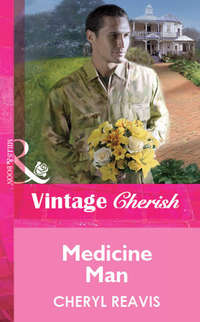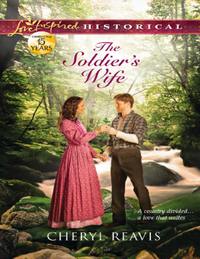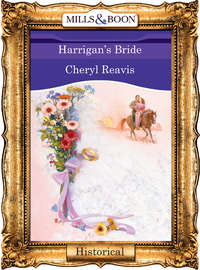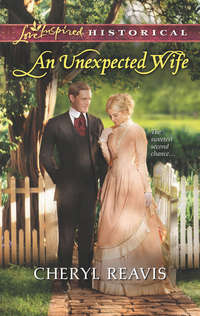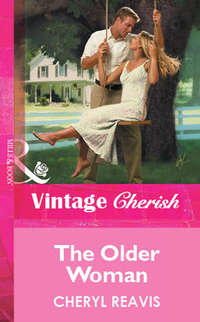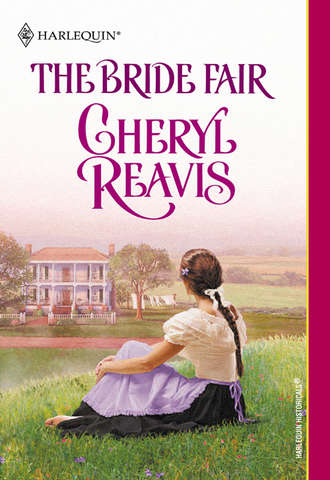
Полная версия
The Bride Fair
A carriage sat in front of the house—the same one that had brought his belongings yesterday—and the colonel was going to win after all. She was suddenly overcome with consternation at the sight of it. She simply could not bear to be seen in public with this man two days in a row.
He was halfway to the street when he realized she was no longer trailing after him.
“What is it?” he asked, waiting for her to catch up.
She made no attempt to do so.
“I can’t,” she said, trying not to sound as hysterical as she felt. “My father would not want me to be seen about town with you like this.”
“He didn’t seem to mind yesterday when he sent you to the train station,” the colonel said. “That aside, I told you I had spoken with him. He feels that my escorting you personally to see about Mrs. Canfield is an excellent plan. I must go to my office, anyway. You can remain with Mrs. Canfield until I—or Perkins—can fetch you home again. Unless you prefer to stay here in the company of a bunch of…I’m ashamed to say, very poorly disciplined officers, who may or may not adhere to the letter of my direct orders and remember that they are gentlemen by military decree, if nothing else. Your choice, of course.”
“My choice? It is not my choice! You have me in a corner and you know it!”
“Yes,” he said agreeably. “Are you coming along or not?”
She was, and he knew that, too. She picked up her skirts and walked purposefully by him and climbed into the carriage, ignoring Perkins’s outstretched hand. She had already learned from yesterday’s buggy ride that Colonel Woodard would do whatever he pleased, and she moved into the far corner of the seat to keep him from parking himself on her pinafore and skirts.
But he made no attempt to sit beside her. He took the opposite seat instead and watched her closely—which was worse. Maria turned her head to keep him from looking directly into her eyes.
They rode down the shady street in silence. A pack of dogs, unmindful of the curfew, came bounding out from under a house to nip at the horses’ heels for a short distance.
“Your father tells me you and Mrs. Canfield have been friends since you were children,” Colonel Woodard said. “He said you used to name your pets after each other. I was particularly interested to hear that there was once a little red hen named ‘Maria Rose.’”
Maria glanced at him, fully aware that he was trying to annoy her again, but she didn’t say anything.
“I believe he mentioned ‘The Three Musketeers,’” the colonel continued. “But he didn’t say who the third one was.”
Maria made no reply to that, either. She was looking at the houses they rode past. There was someone sitting on nearly every porch, all of them watching, waiting to see what indignity would be inflicted upon them next, and all of them trying to decipher the meaning of Maria Markham’s letting herself be seen in the company of the new Yankee colonel.
Again.
“Have courage, Miss Markham,” he said.
“I have no reason to fear,” she said pointedly, and she might have meant it if they were not nearing the Kinnard house. Acacia Kinnard ran this town—at least when it came to social matters. Her husband was a man of property and influence—money—even in these hard times. And whenever she snubbed another woman, that woman’s social invitations ended.
“Maria!” Mrs. Kinnard called from her second-story porch. “Is the curfew lifted?”
“No, Mrs. Kinnard. I have permission to see about Suzanne Canfield.”
“Indeed,” Mrs. Kinnard said, obviously pleased. “Well done, Maria!”
“Would you like to visit with this lady a bit?” Colonel Woodard asked under his breath.
“Good heaven’s no,” Maria said in alarm. “I must see about Suzanne,” she added. Knowing Acacia Kinnard, she would want Maria to expand on her success and arrange for all the Kinnard family and friends to escape the curfew, as well.
“I do hope the Ladies’ Literary Society will be able to meet soon,” Mrs. Kinnard called as if on cue. “I so miss our readings. I was truly looking forward to hearing about the Scottish chiefs. Do you know when the curfew will be lifted, Maria?”
“No,” Maria answered, in spite of the fact that the question was by no means directed to her.
“Friday, ma’am,” Colonel Woodard said, taking the hint.
“Friday! Are you certain?”
“I am, ma’am. That is, if there are no further…incidents. We will return to the previous rules and curfew—10:00 p.m.”
“Excellent, Maria!” she called, as if Maria had been the one who made the announcement. “I believe the next meeting—Saturday—will be at your house.”
“No, I don’t think—” Maria began.
“Your house, Maria,” Mrs. Kinnard said firmly. “At the usual time. And I trust your father will want to join us. Gentlemen are always welcome.”
Maria tried to hide her exasperation and waved goodbye instead of answering. A Ladies’ Literary Society gathering was the absolute last thing she needed.
“I hope you are satisfied,” she said to the colonel.
“Being helpful always gives one a certain…satisfaction,” he said.
“You were not helpful, sir,” Maria assured him.
“I don’t believe it would be appropriate to continue the stricter curfew so that you don’t have to entertain the literary society.”
“You haven’t met the literary society,” Maria said, glancing in his direction. To her great surprise the man very nearly smiled.
Конец ознакомительного фрагмента.
Текст предоставлен ООО «ЛитРес».
Прочитайте эту книгу целиком, купив полную легальную версию на ЛитРес.
Безопасно оплатить книгу можно банковской картой Visa, MasterCard, Maestro, со счета мобильного телефона, с платежного терминала, в салоне МТС или Связной, через PayPal, WebMoney, Яндекс.Деньги, QIWI Кошелек, бонусными картами или другим удобным Вам способом.


